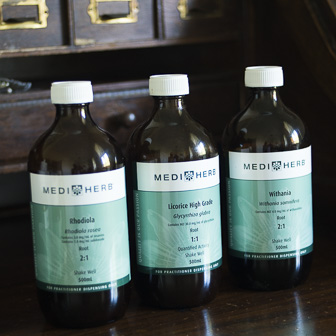The Gut-Brain Axis: The Gut is our “Second Brain”
December 30, 2021
With cutting-edge microbiome research emerging daily, modern medicine is starting to see the bigger picture between gut bacteria and chronic disease. One example of this is the link between gut bacteria and its ability to affect mood, as well as mental function under stressful circumstances. As a result, science is now exploring new treatment strategies that target the microbiome to favourably influence mental health.
To gain a better understanding of how gut bacteria affects mood, let’s explore the gut-brain connection and its impact on mental wellbeing.
Getting to Know the Inner Workings of the Gut-Brain Axis
A direct communication pathway exists between the gut and brain. The channel that physically connects both organs is known as the vagus nerve. Wired throughout the gastrointestinal tract, afferent vagus nerve fibres detect signals from the gut microbiome and transfer this information to the brain. Specifically, these signals include:
- Microbial metabolites produced by gut bacteria, such as short-chain fatty acids (SCFA) including butyrate, acetate and proprionate;
- Neurotransmitters (e.g. serotonin) released by cells in the gut lining; and,
- Inflammatory cytokines produced by immune cells within the gut.
The gut-brain crosstalk comprises of approximately 80% vagus nerve communication from the gut to the central nervous system, compared with 20% of signals sent from the brain to the gut; emphasising that the gut, via the vagus nerve, is the centre of communication within the gut-brain axis.
This is an important mechanism by which the microbiome affects mood. By influencing the vagus nerve, the microbiome can affect the entire parasympathetic nervous system (PNS), which oversees a vast array of bodily functions including regulation of mood, digestion and heart rate. As such, science has sought to explore the health effects of the gut-brain axis; yielding significant insights into the role of gut health upon mood and the stress response.
Understanding the Link Between the Gut, Mood, the Stress Response and the Vagus Nerve
In a nutshell, scientific evidence tells us that gut bacteria composition influences the local gastrointestinal environment. This in turn determines microbial production of SCFAs, enteroendocrine release of neurotransmitters, and immune responses in the gut; which collectively influence vagus nerve activity and its ability to support a healthy mood. Interestingly, in humans with clinical mood disorders, decreased microbial diversity, lower faecal SCFA levels, reduced tryptophan availability and elevated inflammatory cytokine activity in the gut have all been observed. This highlights the clinical significance of these factors in patients with low mood. So, what’s going on in the gut directly effects how we feel.
Moreover, in patients with depressive symptoms, reduced microbial diversity is associated with elevated cortisol levels, the stress hormone released by the adrenal glands. Building on this, persistent hypothalamic-pituitary-adrenal (HPA) axis activation, common in low mood-states, leads to stress-induced elevated cortisol levels and decreased resilience to challenging situations. These findings emphasise an association between gut microbiome imbalances, stress and depressive-like mood symptoms.
In addition, chronic stress (i.e. chronic cortisol exposure) increases sympathetic nervous system (SNS) activity, consequently inhibiting activity of the vagus nerve. As a result, heightened SNS activity adversely affects the regulatory actions of PNS on the body, further amplifying low mood and poor mental function. Stress-induced PNS dysregulation may also contribute to abnormal symptom presentations, such as irregular bowel motility seen in irritable bowel syndrome (IBS). With these mechanisms in mind, let’s a take a deep-dive into evidence-based probiotic strains that enhance vagus nerve activity to restore the gut-brain axis, healthy mood and the stress response.
Enriching the Gut-Brain Axis: Probiotics to Modulate Mood and the Stress Response
Research has shown that particular strains of probiotics can reduce not only the symptoms of stress, palpitations and anxiety for example, but help to improve our resilience to stress.
In a randomised, double-blind, placebo-controlled trial, 1.75 billion colony forming units (CFU)/d of Lactobacillus paracasei Lpc-37 has been shown to support the gut-brain axis and improve resilience to stress. Taken over five weeks by 113 patients, L.paracasei Lpc-37 improved patient heart rate in response to stress, reduced perceived stress, and normalised night cortisol levels, thereby enabling healthy regulation of the stress response. These results suggest L.paracasei Lpc-37 restores healthy neuroendocrine function and HPA axis activity, therefore benefiting a healthy stress response.
Further to this, 10 billion CFU/d of Lactobacillus plantarum 299v was found to favourably influence HPA axis activity in students undertaking exams (associated with acute stress). In this randomised, double-blind, placebo-controlled study, 299v administered over 14 days significantly reduced cortisol levels compared to placebo (p<0.05). In addition, 20 billion CFU/d of 299v over eight weeks has been shown to improve cognitive function in patients with major depressive disorder. Collectively, these findings suggest 299v enhances stress adaptation, as evidenced by normalised cortisol levels and improved cognitive health in adults.
Additionally, 299v has been found to increase SCFA production, support healthy neurotransmitter activity and mitigate the inflammatory response; actions known to facilitate vagus nerve activity and healthy gut-brain axis communication. Therefore, these mechanisms may account for 299v’s beneficial effects on the stress response.
Managing the Microbiome for Better Mood and Stronger Stress Resilience
While research continues to explore the relationship between gut microbiota and mood, current evidence suggests that supporting the gut-brain axis is imperative to enhancing mental wellbeing and function. There’s so much scope in terms of what’s available both with nutritional medicine, probiotics and microbiome modulating herbs.
More







